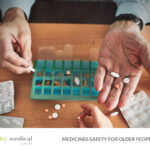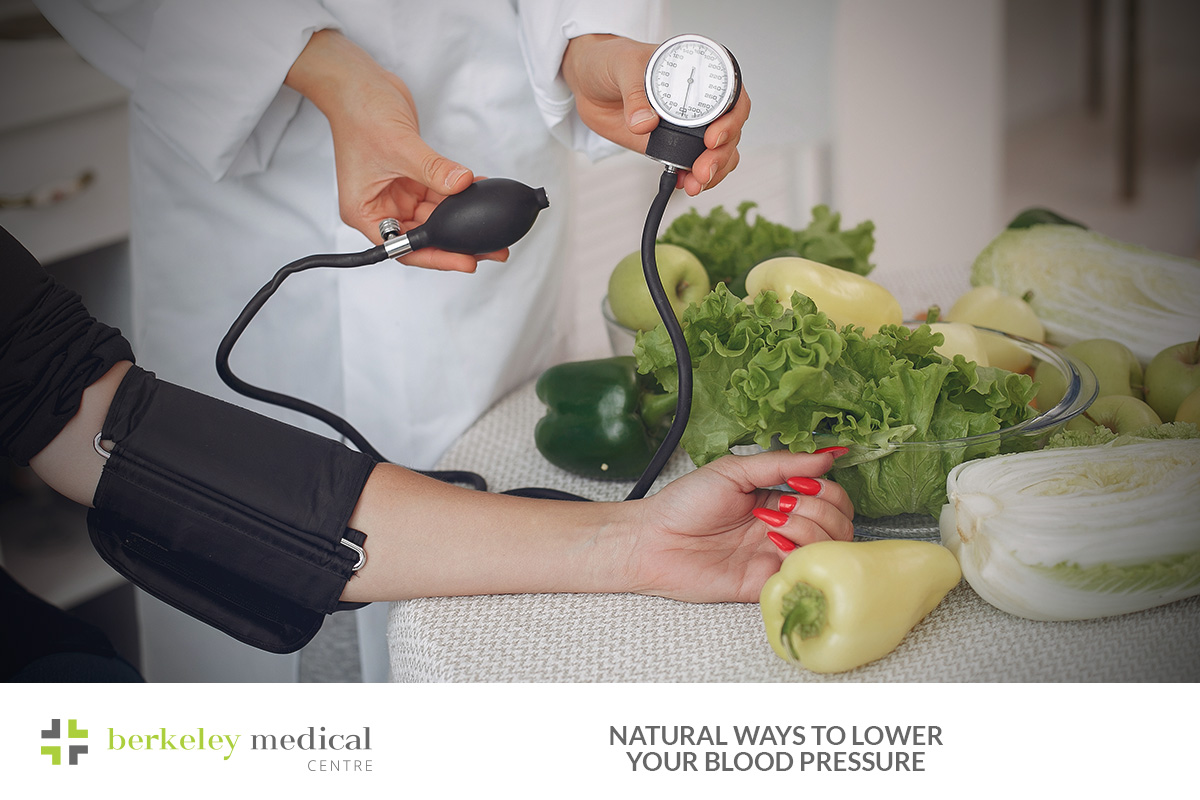High blood pressure, also known as hypertension, is one of the most common health concerns in Australia. Often called the “silent killer,” it develops without obvious symptoms but significantly increases the risk of heart disease, stroke and kidney problems. Understanding natural ways to lower blood pressure can play a vital role in protecting your long-term heart health and overall well being.
Medication is a vital treatment option for many people. However, making natural lifestyle changes can also play a powerful role in lowering blood pressure and supporting overall wellbeing.
At Berkeley Medical Centre, we encourage a proactive approach to primary care that combines medical treatment with healthy lifestyle habits. In this article, you’ll learn practical, evidence-based and natural ways to lower your blood pressure safely and effectively.
What You’ll Learn
- Why lifestyle choices influence blood pressure
- The best natural methods for managing hypertension
- How everyday habits impact long-term heart health
- The role GPs and allied health services can play in your care
Understanding High Blood Pressure
Blood pressure measures the force of blood against the walls of your arteries. A normal reading is around 120/80 mmHg, while consistent levels above 140/90 mmHg are classified as high.
If left untreated, high blood pressure increases the risk of:
- Heart disease and heart attack
- Stroke
- Kidney damage
- Vision problems
The positive news is that small, consistent changes in your lifestyle can have a lasting effect on blood pressure management.
Natural Ways to Lower Blood Pressure
Exercise Regularly
Regular exercise strengthens your heart and helps it pump blood more efficiently. As a result, your arteries experience less pressure.
- Walk at least 30 minutes a day
- Aim for 150 minutes of moderate exercise each week
- Choose enjoyable activities such as swimming, cycling or dancing
Consistent movement supports both blood pressure control and general wellbeing.
Reduce Salt in Your Diet
Australians often consume more sodium than recommended, largely from processed and packaged foods. Too much salt raises blood pressure and strains the cardiovascular system.
- Prepare fresh meals at home where possible
- Use herbs, garlic or lemon juice for flavour instead of salt
- Select “low sodium” options when grocery shopping
By cutting back on salt, you give your arteries the best chance to remain healthy.
Increase Potassium-Rich Foods
Potassium balances sodium levels in the body and relaxes blood vessel walls. A diet rich in potassium naturally supports healthy blood pressure.
- Add bananas, avocados, spinach, sweet potatoes and tomatoes to your meals
- Include beans, lentils, yoghurt and salmon
- Focus on whole, unprocessed foods
If you are taking prescribed medication for blood pressure, consult your GP before making large dietary changes.
Follow a Balanced, Whole-Food Diet
Eating whole foods directly supports heart health and reduces blood pressure.
- Choose plenty of vegetables, fruits, whole grains and lean proteins
- Incorporate Mediterranean or DASH eating patterns
- Limit sugary drinks and refined carbohydrates such as white bread
This balanced approach fuels the body while reducing pressure on your cardiovascular system.
Drink Alcohol in Moderation
Excess alcohol consumption can raise blood pressure. While occasional drinking may be safe, keeping your intake low makes a difference.
- Stick to one drink a day for women and two for men
- Plan alcohol-free days throughout the week
- Replace alcoholic drinks with sparkling water or herbal tea
Cutting back supports better blood pressure and overall long-term health.
Maintain a Healthy Weight
Extra weight puts strain on the heart and elevates blood pressure. Even small weight reductions can have noticeable effects.
- Aim to lose 5–10% of body weight if overweight
- Combine physical activity with balanced eating habits
- Ask your GP for support with personalised weight management
When weight drops, blood pressure often improves.
Manage Stress Effectively
Chronic stress keeps the body in a constant “fight or flight” state, which contributes to hypertension.
- Practise mindfulness, yoga or tai chi
- Use deep breathing exercises daily
- Schedule time for hobbies and relaxation
Managing stress not only lowers blood pressure but also improves mental health.
Limit Caffeine if Necessary
Caffeine can temporarily raise blood pressure, especially in sensitive individuals.
- Monitor your response to coffee, tea or energy drinks
- Switch to decaf or caffeine-free alternatives if needed
- Avoid caffeine late in the day to improve sleep quality
Reducing caffeine helps stabilise blood pressure levels.
Quit Smoking
Each cigarette causes a temporary increase in blood pressure and damages blood vessels over time.
- Seek support through GP-led quit programs and counselling
- Consider nicotine replacement therapies
- Celebrate progress with small milestones
Quitting smoking provides immediate and long-term benefits for blood pressure and heart health.
Include Calcium and Magnesium in Your Diet
These minerals help regulate blood vessel function and support heart health.
- Eat dairy, leafy greens and tofu for calcium
- Add nuts, seeds, legumes and whole grains for magnesium
- Prioritise dietary sources rather than supplements unless prescribed
By nourishing your body with essential minerals, you support steady blood pressure levels.
Enjoy Berries
Berries are high in antioxidants that help improve blood vessel function.
- Add blueberries, strawberries and raspberries to your daily meals
- Use fresh or frozen berries in smoothies, porridge or yoghurt
- Rotate berry types for variety and balance
This simple dietary addition provides both taste and cardiovascular benefits.
Practise Deep Breathing and Meditation
Slow breathing and mindfulness techniques activate your body’s relaxation response, which reduces stress and lowers blood pressure.
- Spend 10 minutes twice daily on deep breathing exercises
- Use mindfulness or meditation apps to stay consistent
- Create a calming routine to practise regularly
Over time, these techniques improve both physical and emotional health.
Eat Dark Chocolate in Moderation
Dark chocolate contains flavonoids that relax blood vessels and support circulation.
- Choose chocolate with at least 70% cocoa
- Keep portions small to avoid excess sugar
- Use cocoa powder in cooking for added benefits
A small indulgence can still support heart health when enjoyed wisely.
Consider Natural Supplements (With Medical Guidance)
Some supplements may help manage blood pressure, but they should always be used under professional guidance.
- Aged garlic extract shows promising effects
- Fish oil supports cardiovascular health
- Berberine may help but requires further research
Consult your GP before starting any supplement, especially if you take prescribed medication.
Stay Hydrated
Proper hydration supports healthy circulation and overall body function.
- Drink 6–8 glasses of water daily
- Replace soft drinks with water or unsweetened alternatives
- Increase fluid intake during exercise or hot weather
Staying hydrated promotes better cardiovascular balance.
Frequently Asked Questions
Yes. Many people successfully reduce blood pressure through diet, exercise and lifestyle changes. However, always follow your GP’s advice regarding medication.
Fresh fruits, vegetables, legumes, whole grains and foods rich in potassium, calcium and magnesium are the most effective.
Staying hydrated can support circulation and overall heart health, but it works best as part of a healthy lifestyle.
Yes. With consistent lifestyle changes, many people reduce their readings and improve overall heart function.
Final Thoughts
You can take real steps to lower your blood pressure naturally by exercising regularly, improving your diet, reducing salt, managing stress and maintaining a healthy lifestyle. These changes not only improve blood pressure but also support overall wellbeing and prevent chronic disease.
At Berkeley Medical Centre, our GPs and allied health team provide personalised care, regular blood pressure checks and support with nutrition, exercise, mental health and chronic disease management. Together, we can create a plan that suits your lifestyle and helps you take control of your heart health.
Disclaimer: This article is for general information only. It should not replace professional medical advice. Always consult your GP before making significant changes to your lifestyle, diet or medication.







